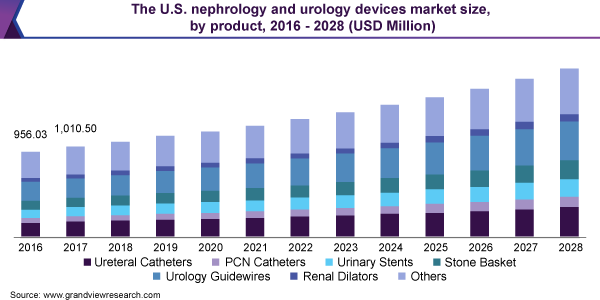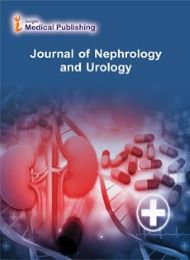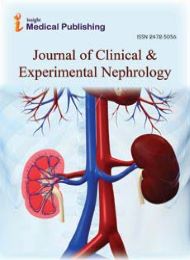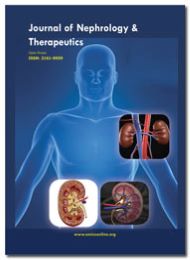Theme: Emerging Technologies in Prevention and Cure of Renal Diseases
Nephrology Congress 2022
NEPHROLOGY CONGRESS 2022 Scientific Committee is grateful to welcome all the participants from all over the world to attain the 20th International Conference on Nephrology, Urology, and Therapeutics scheduled to be held on November 28-29, 2022 in Singapore City, Singapore.
NEPHROLOGY CONGRESS 2022 will highlight the most active and latest issues in the field of Nephrology. The meeting is based on the theme “Emerging Technologies in Prevention and Cure of Renal Diseases”. The highlights of the conference include Nephrology, Acute Kidney Injury (AKI), Chronic Kidney Disease (CKD), Kidney Transplantation, Dialysis, and Renal Care, Paediatric Nephrology, Diabetic Nephropathy, etc.
WHY TO ATTEND?
NEPHROLOGY CONGRESS 2022 is aimed the World's leading Medical Conference. The two days’ event on the same will host many Scientific and technical sessions and sub-sessions on leading and latest research transformation related to the Nephrology, covering the globe. The attendees can find exclusive sessions and panel discussions on the latest innovations in Nephrology by:
- Best platform for international business and Networking opportunities
- Keynote forums by eminent Professors, Engineers
- Novel techniques to benefit your research and innovation
- Open Innovation Challenges
- Meet the editors of refereed journals, Society and Association members across the world
- Poster presentations by Young Researchers on Nephrology
- Excellent platform to showcase the latest innovation and concept in the relevant field
- Lectures from prominent speakers
Target Audience:
- Nephrologists
- Urologists
- Gastroenterologist
- Pathologists
- Immunologists
- Physicians
- Rheumatologists
- Paediatricians
- Various Societies and their members
- Research Scholars
- Institutes-Medical Schools Students
- University Professors
- Medical Devices Manufacturing Companies
- Laboratory technicians
- Business Entrepreneur
Track 1: Nephrology
Nephrology is that the branch of the practice of adult medicine and paediatrics that deals with the study of kidneys, their treatment, and preservation of kidney health. It also studies the factors affecting kidneys (diabetes and high blood pressure), systemic diseases like hypertension, renal osteodystrophy. Many diseases that affect the kidneys often aren't limited to the organ itself, they affect other organs within the body and might cause lupus, tract infections (UTI), and polycystic renal disorder which require special treatment. Many treatments related to kidney include kidney dialysis, fistula management, kidney, and bone biopsy. Tests and procedures to work out the diagnosis of kidney diseases are blood tests, urine tests, ultrasound imaging tests, and kidney biopsy to get rid of a sample of kidney tissue for testing.
Track 2: Impact of Covid-19 on Nephrology
People with kidney diseases and chronic medical conditions are at higher risk of viral infectious diseases. people that are undergoing dialysis have a lower system which makes it difficult for them to fight infections. Coronavirus side effects in an acute kidney injury include acute tubular necrosis with septic shock, direct infection to the kidney, and a rise in clotting. There are chances the function of kidneys declines after contracting with coronavirus and through infection. Nephrologists have observed high levels of protein within the urine (Proteinuria) in patients having COVID-19. Though researchers and medical professionals haven't recommended patients stop employing a particular drug, taking precautions is usually a requirement. Getting vaccination shots, maintaining good hygiene, taking medicines as prescribed, consulting the doctor timely is very important.
Track 3: Renal Pathology
Renal pathology deals with the characterization of medical diseases (non-tumors) and therefore the diagnosis of kidneys. Renal pathologists work together with nephrologists and kidney transplant surgeons who specialized within the diagnosis of medical diseases of the kidneys. The pathologist interprets the biopsy tissue within the clinical context, synthesizes findings from microscopy, microscopy, and finds out the diagnosis. Medical renal diseases may affect the tubules and interstitium, the glomerulus, the vessels, or a mix of those departments.
Track 4: Renal Replacement Therapy
Renal replacement therapy replaces the blood filtering function that the kidneys perform normally. The therapy is usually recommended for patients who are affected by failure, acute kidney injury, and chronic nephrosis when the kidneys aren't working well. Kidney transplantation is that the final word sort of replacing the old kidney with the donor's kidney. Renal replacement therapy also includes filtration of blood with or without the help of machines, hemofiltration, hemodiafiltration, and also dialysis. Therapy is typically viewed to be a life-extending treatment and not a cure for uropathy, although if the disease is managed well with dialysis and early diagnosis, the results are quite favorable. The available renal replacement therapies include peritoneal dialysis (PD), intermittent hemodialysis (IHD), and continuous renal replacement therapy (CRRT).
Track 5: Pediatric Nephrology
A study where a pediatric nephrologist treats kidney or tract disease, bladder problems, and high pressure of youngsters from infancy through late adolescence years is termed pediatric nephrology. Pediatric nephrology includes treating dialysis, kidney biopsy, kidney transplantation, interpretation of the kidneys through x-ray studies, and pressure level monitoring. Children getting suffering from kidney diseases is treatable disorders to life-threatening conditions. Certain birth defects, hereditary problems, infection, urine blockage or reflux, systemic diseases like autoimmune disorder and diabetes, and syndrome are causes of nephropathy in children. Comprehensive disease management is vital to keeping kidney diseases under control and preventing the expansion of it, anemia, and other complications among children.
Track 6: Clinical Nephrology
Clinical nephrology is that the fame of medication that analyzes the working of kidneys, their functioning, and treatment is given as per the analysis from the shape of kidney functioning, renal transplantation to the most recent transplant techniques. it's a branch of therapeutics and pediatrics that's concerned about the investigation of kidney function, Nephrology maladies, the treatment of Nephrology ailments, and renal transplantation treatment (dialysis and kidney transplantation). Kidneys play an important role in life with their complex network of blood vessels and complex network of tubes and tubules that filter the blood of its waste products and excess water. Kidneys maintain liquids, electrolytes, and corrosive base direction that are modified by kidney malady conditions and additionally drugs and toxins. Kidneys perform several functions and clinical nephrologists tend to take care of expertise in primary kidney disorders.
Track 7: Chronic Kidney Disease
Chronic Kidney Disease (CKD) may be a kidney disorder where the functioning of kidneys tends to prevent after ages (months to years). The kidneys can’t filter blood the way kidneys should and it damage which causes wastes to make up within the body and will cause other health problems like cardiovascular disease and stroke. Though there aren't any initial symptoms normally, a number of the common symptoms observed later are leg swelling, loss of appetite, feeling tired, vomiting, and confusion. Increased risk of cardiovascular disease, high force per unit area, hypertension, polycystic renal disorder, and glomerulonephritis are a number of the causes of chronic nephropathy. Early screening and initial treatments include medications to lower pressure, sugar, and cholesterol levels.
Track 8: Acute Kidney Failure
The sudden dysfunction of kidneys where they can not filter waste from the blood is termed acute renal failure. renal disorder develops rapidly in a very few hours or days and perhaps fatal. Symptoms are swelling because of fluid retention, decreased urinary output, and shortness of breath, fatigue, and nausea. Acute nephrosis can occur when patients have experienced direct damage to the kidneys, once you have a condition that slows down blood flow to the kidneys and when kidneys urine drainage tubes (ureters) become blocked and therefore the waste cannot leave your body through urine. Risk factors are often observed in reference to other medical conditions like liver diseases, failure, certain cancers, and their treatments, being hospitalized for a significant condition that required medical care.
Track 9: Hematuria and Proteinuria
The presence of blood or red blood cells in urine is called hematuria. The causes of hematuria are infection occurred in the urinary tract, bladder, kidney or bladder cancer, inflammation of the kidneys, or prostate and polycystic kidney disease. There are two types of hematuria and they are microscopic and gross hematuria. The Non-visible hematuria (microscopic hematuria) means that the blood can only be seen with a microscope whereas visible hematuria (gross hematuria) means the urine appears red or the color of tea or cola to the naked eye. Urine tests, blood tests, CT scans, kidney ultrasounds, cystoscopy, kidney biopsy are the tests available to determine the hematuria and the cause of it, and not all tests are recommended to anyone.
Proteinuria is observed when an excess of protein is present in the urine which can be a sign of kidney damage. When the kidneys are damaged, the filters in the kidneys let proteins such as albumin leak from the blood into the urine. Dietary changes, weight management, blood pressure, and diabetes medication, and dialysis are the treatments nephrologists ask the patients to maintain.
Track 10: Urology
The branch of medication that focuses on the medical diseases of the male and feminine tract systems and male reproductive organs is named urology. Both the urinary and reproductive tracts are closely linked and if disorders of 1 often tend to affect the opposite. Urological techniques include invasive robotic and laparoscopic surgery, laser-assisted surgeries, and other scope-guided techniques. Urologists receive training in open and minimally interfering surgical techniques, employing real-time ultrasound guidance, fiber-optic endoscopic equipment, and various lasers within the treatment of multiple benign and harmful conditions. Urology is related to urologists who often collaborate with different department practitioners associated with oncology, nephrology, gynecology, andrology, pediatric surgery, colorectal surgery, gastroenterology, and endocrinology.
Track 11: Urinary Tract Infections
Urinary tract infections (UTIs) are infections that are associated with any parts of the apparatus urogenitalis like kidneys, bladder, or urethra. Often observed in women, tract infections occur within the bladder or urethra, but serious infections involve the kidney. Female anatomy, sexuality, certain kinds of birth controls, menopause, tract abnormalities, blockages within the tract, suppressed system, catheter use and up to date urinary procedure are the chance factors specific to women who have tract infections. they're often treatable and are short-term infections. Maintaining healthy hygiene, staying hydrated, the practice of fine sexual hygiene, urinating when the requirement arises prevents UTIs. In men, prostate problems cause tract infections and sexually transmitted diseases are the foremost common reason for UTIs in younger men.
Track 12: Hydro Nephrosis
A condition characterised by excess fluid in an exceedingly kidney due to a back-up of urine. Hydronephrosis is caused by a blockage within the tube that connects the kidney to the bladder (ureter). Possible causes include a kidney stone, an infection, an enlarged prostate, a blood clot or a tumour. Symptoms include difficulty urinating and pain within the side, abdomen or groin. Treatment may include antibiotics if there's an infection. In severe cases, the urine may have to be drained from the bladder or kidney.
Track 13: Dialysis
The process of removing waste products, excess water, toxins, and solutes from the blood in people whose kidneys now not function naturally is named dialysis. Dialysis involves diverting blood to be cleaned. Haemodialysis dialysis and peritoneal dialysis are two forms of dialysis. Haemodialysis, the foremost common variety of dialysis procedure where a tube is attached to a needle in your arm and also the blood passes along the tube, and external machine filters the blood before it's passed back to the arm along another tube. The peritoneal dialysis process on the opposite side uses the within lining of your abdomen (the peritoneum) because the filter, rather than a machine. The peritoneum contains thousands of small blood vessels, making it a useful filtering device a bit like the kidneys. Dialysis treatment may be stopped if the uropathy is temporary and therefore the patients get recovered.
Track 14: Diabetic Nephropathy
Diabetic nephropathy also called diabetic nephrosis caused by type 1 and type 2 diabetes could be a complication that affects the kidneys. It affects the power of kidneys of removing waste and fluid from the body. Diabetic nephropathy can slowly damage the kidney's filtering system but early treatment may prevent or abate the disease progress. Dialysis and kidney transplantation are the treatment options if diabetic nephropathy results in nephropathy which is end-stage renal disorder. Diabetes can increase the danger factors of diabetic nephropathy which include hyperglycemia, hypertension, and high blood cholesterol, and obesity, hereditary and smoking habits. Adequately managing diabetes and high pressure, maintaining a healthy lifestyle is that the thanks to prevent or delay diabetic nephropathy.
Track 15: Renal Nutrition & Diet
Compromised kidney functions people are often advised to follow a renal diet that's low in sodium, phosphorous, and protein on slow down the quantity of waste in their blood. The kidneys don't tend to get rid of waste and fluids properly once they are compromised kidneys. The renal nutrition and diet emphasize maintaining a balance between food intake and typically limiting fluids. Every person’s body is different and then are their requirements so a renal dietician tailors a diet in line with their need. Kidney patients monitor sodium intake as kidneys cannot eliminate excess sodium and fluid. kidney disease can not remove excess potassium and thus it causes hyperkalemia and to avoid that, listening to serving size, choosing fresh produce, limiting dairy products, and substituting salt with other spices help. Monitoring phosphorus intake as high levels of phosphorus can pull calcium out of the bones, and make them weak so avoiding the word “PHOS” on ingredient labels, eating smaller portions, and selecting foods that have low phosphorous.
Track 16: Kidney Transplantation
Surgery performed to exchange a diseased kidney with a healthy kidney from a donor is named a kidney transplant. someone might need a kidney transplant once they are at end-stage renal disease (ESRD) which may be a permanent condition of kidney disease that needs dialysis. Often members of the family are an honest match or others donate one among their kidneys. Donors may be living or deceased one and also the living donors can lead a healthy life with one healthy kidney. The new kidney is placed within the lower abdomen. Complications after the kidney transplant include bleeding, infection, blockage of urine within the ureter, blockage of the blood vessels within the new kidney. Kidney transplant recipients are given immunosuppressants to stop the body from rejecting the new kidney and long-term use of immunosuppressants puts the kidney transplant patients at higher risk for infections and cancer. Current issues related to kidney transplantation are kidney allocation policies, xenotransplantation, transplant tourism, tolerance, and kidney transplantation clinical trials.
Track 17: Drugs and Medication for Kidney Disease
Drugs that are suggested for people with kidney diseases are always supported medical record and lifestyle. Nephrologists, the doctors who treat kidney diseases and health give brief about the side effects if any similarly while prescribing drugs to the patients. Co-trimoxazole is an antibiotic that's advised to require after the kidney transplant or after you are taking cyclophosphamide (immunosuppressant) or rituximab. Isoniazid could be a drug which will be prescribed after a kidney transplant for patients who may get contact with or have previously had tuberculosis (TB) which may be a long-term infection that affects the lungs, chest, or every now and then any a part of the body. Azathioprine, ciclosporin, and mycophenolate medicines also come under immuno-suppressants that are recommended for kidney diseases. Cyclophosphamide, also an immune suppressant is taken in bigger doses to treat cancers. Cyclophosphamide medicine is prescribed to be taken for myeloma, vasculitis, lupus, or membranous nephritis. together with this, following a diet or a renal diet is commonly recommended to own a healthy lifestyle for uropathy suffering patients.
Track 18: Renal Cell Cancer
Renal cell cancer may be a kidney cancer disease within which malignant (cancer) cells are present within the lining of tubules (very small tubes) within the kidney. Tiny tubules which are present within the kidneys strain waste and clean the blood. Smoking and misuse of certain pain medicines, overweight, high blood pressure; a case history of renal cell cancer can affect the danger of renal cell cancer. within the early stages, no signs and symptoms of renal cell cancer are observed but signs and symptoms may appear because the tumor grows. they're blood within the urine, a lump within the abdomen (belly), loss of appetite, pain within the side that does not depart, weight loss for no known reason, and fatigue.
Track 19: Biopsy
A biopsy is taking one or more samples of the tissue to further examine them under special microscopes to determine the samples in greater detail. Kidney Biopsy samples is taken in two ways one is percutaneous biopsy and open biopsy. A kidney biopsy may be performed by specialists who is a nephrologist, urologists, transplant surgeons, or interventional radiologists. The percutaneous biopsy is where a needle is placed through the skin that lies over the kidney and is guided to the proper place within the kidney, usually with the assistance of ultrasound. Open biopsy is when a surgery is performed where the kidney sample is taken from the kidney and therefore the sample is distributed to a pathology lab to test for the signs of disease. Risks involved within the biopsy are small yet they're advised to be discussed with a medical professional.
Track 20: Glomerulonephritis
Glomerulonephritis (gloe-mer-u-low-nuh-FRY-tis) could be a group of diseases that cause inflammation of the small filters within the kidneys (glomeruli). The function of the kidneys is to get rid of excess fluid, electrolytes and waste from the blood and pass them into your urine. Glomerulonephritis can come on suddenly or gradually grow to be chronic. Lupus and diabetes can cause glomerulonephritis or it can occur on its own. Severe or prolonged inflammation related to glomerulonephritis can damage the kidneys and treatment depends on the sort of glomerulonephritis a patient has. Causes of glomerulonephritis may be infections like post-streptococcal glomerulonephritis, bacterial endocarditis, viral infections; immune diseases like lupus, goodpasture’s syndrome, IgA nephropathy; vasculitis like polyarteritis and granulomatosis with polyangiitis.
Track 21: Lupus Nephritis
The condition where the body’s system attacks our tissues and organs is termed lupus. Lupus affects skin, kidneys, blood cells, brain, heart, and lungs, and specifically, when it affects the kidneys it's termed lupus nephritis. Healthcare professionals treat lupus nephritis by giving the treatment that helps to cut back inflammation within the kidneys, decrease system activity and block the immune cells from attacking the kidneys or making antibodies that attack the kidneys. Early diagnosis of lupus nephritis depends on blood tests, urinalysis, X-rays, ultrasound scans of the kidneys, and sometimes a kidney biopsy. On urinalysis, a nephritic picture is found and red corpuscle casts, red blood cells, and proteinuria are found. Drugs like steroids and antimalarial drugs are prescribed for lupus nephritis together with diet changes and monoclonal antibodies.
Track 22: Diagnosis and treatment of kidneys
Diagnosis or diagnosing is determining the condition supported the symptoms of an individual. case history and physical examination information are typically collected from the person seeking medical aid to seek out out the diagnosis. In kidney diagnosis, blood tests, age, gender, urine test to live the degree of waste material called creatinine within the blood are tested. The treatments related to kidney diseases include hemodialysis, peritoneal dialysis, biopsy, kidney transplantation, and conservative management which treat renal disorder without dialysis.
Track 23: Pre-eclampsia and kidney disease
Complications related to pregnancy which is characterized by high force per unit area are called pre-eclampsia (toxemia). In general, there is also no symptoms but high vital sign and protein loss in urine are key features in pre-eclampsia. Water retention and swelling of legs are common in pregnant women which make it harder to tell apart it as pre-eclampsia from a traditional pregnancy. Women having uropathy even with mild reductions are in danger of toxemia which could cause acute kidney injury, endothelial damage, and podocyte loss. Chronic renal disorder may put risk to the event of preeclampsia because of comorbid conditions, like hypertension, but is additionally connected with impaired glycocalyx integrity and alterations within the complement and renin-angiotensin-aldosterone systems. Pre-eclampsia is diagnosed before delivery but in some cases, it should begin within the period after delivery which is understood as postpartum preeclampsia.
The global nephrology and urology devices market size was valued at USD 4.34 billion in 2020 and is expected to grow at a compound annual growth rate (CAGR) of 6.6% from 2021 to 2028. The high incidence and prevalence of Chronic Kidney Disease (CKD) coupled with rising elderly population is the major factor driving the market growth. According to the estimates of the National Kidney Foundation, 10.0% of the worldwide population is affected by CKD. Thus, the increasing target population is boosting the overall product demand. Rising incidences of diabetes and high blood pressure (hypertension) globally are also contributing to the growth of the market as these two diseases are primary reasons for kidney failure. As per the data published by the American Kidney Fund, 38.4% of kidney failures are caused due to diabetes, and 25% due to high blood pressure.

This high correlation between kidney failure and aforementioned disorders is expected to accentuate the demand for urology & nephrology devices. Moreover, the cases of diabetes and hypertension are increasing in developing countries of Asia Pacific (APAC) & Middle East and North Africa (MENA) regions, owing to changes in lifestyle and rising geriatric population. For instance, as per the International Diabetes Federation, in 2019, the number of diabetes cases in the IDF MENA region was 55 million, which is estimated to reach 108 million by 2045. These factors are expected to increase product use and demand during the forecast period.
In addition, the market is expected to be driven by the increasing geriatric population, which is highly susceptible to various diseases including kidney and urinary disorders. As per the WHO, the number of people aged 65 years and above is expected to rise from 7% in 2000 to 16% in 2050, globally. Old age is considered one of the greatest risk factors for developing various medical conditions. Aging also weakens the immune system and consequently increases a patient’s susceptibility to various ailments, such as renal disorders, diabetes, prostate cancer, and urinary retention. According to the American Society of Nephrology, urologic diseases are the third-most common concern among the geriatric population, and these account for approximately 47% of physician visits.
Furthermore, the growing demand for minimally invasive procedures due to the recent technological innovations is expected to increase product sales. Devices, such as ureteral stents, catheters, guidewires, & renal dilators, are developed using advanced materials including nitinol, polyurethanes/polycarbonates, and silicone. Carbothane is a material resistant to several chemicals, such as iodine, hydrogen peroxide, or alcohol, which increases its life. For instance, MAHURKAR Chronic Carbothane catheter, developed by Medtronic plc is made of Carbothane, which provides superior kink resistance and enables simple single insertion, while facilitating high flow rates with low arterial & vein pressure. Thus, the usage of advanced materials in product manufacturing for enhanced strength and resistance increases the demand, thereby driving the market growth.
Countries, such as U.S. and Canada, have witnessed a high prevalence rate of chronic kidney and urinary disorders owing to sedentary lifestyles. In addition, the increasing number of patients undergoing surgeries and rising consumer awareness about minimally invasive surgeries are also contributing to the market growth in these countries. In addition, as per the Population Reference Bureau fact sheet, the number of people in the U.S. aged 65 years and above is expected to nearly double from 52 million in 2018 to 95 million by 2060 (rise from 16% to 23%). This will support the market growth. Similarly, according to the Canadian Institute for Health Information’s (CIHI) report Canadian Organ Replacement Register (CORR), 2019, the number of people in Manitoba, a Canadian Province, on dialysis has increased by 57% from 2009 to 2019.
Moreover, due to the global pandemic, healthcare facilities, such as hospitals, have been exhausted with a large influx of such patients; therefore, many countries have postponed elective surgeries and other healthcare procedures for an indefinite period. Moreover, the demand for renal disease treatment products used in homecare has increased. Similarly, the demand for home healthcare among the aging population is also increasing as they are at a higher risk of acquiring the infection and cannot visit any healthcare facility. Home health service providers are offering multiple home care services, including the delivery of medicines. This is likely to boost the growth of nephrology and urology devices market during the forecast period.
Neuroscience Conference Committee is glad to announce “20th International Conference on Nephrology, Urology and Therapeutics” November 28 -29, 2022 in Singapore City, Singapore by focus on the theme: “Emerging Technologies in Prevention and Cure of Renal Diseases Neuroscience” Nephrology Congress 2022 developments are maintaining their momentum. Neuroscience Conference program delves into strategic discussions.
Neuroscience Conference Committee is intended to honour prestigious award for talented Young researchers, scientists, Young Investigators, Post-Graduate students, Post-doctoral fellows, Trainees, Junior faculty in recognition of their outstanding contribution towards the conference theme. The Young Scientist Awards make every effort in providing a strong professional development opportunity for early career academicians by meeting experts to exchange and share their experiences on all aspects of Neuroscience.
Young Research’s Awards at Nephrology Congress 2022 for the Nomination: Young Researcher Forum - Outstanding Masters/Ph.D./Post Doctorate thesis work Presentation, only 25 presentations acceptable at the Nephrology Congress 2022 young research forum.
Benefits
- Young Scientist Award recongination certificate and memento to the winners.
- Our conferences provide best Platform for your research through oral presentations.
- Learn about career improvement with all the latest technologies by networking.
- Young Scientists will get appropriate and timely information by this Forum.
- Platform for collaboration among young researchers for better development.
- Provide an opportunity for research interaction and established senior investigators across the globe in the field.
- Share the ideas with both eminent researchers and mentors.
- It’s a great privilege for young researchers to learn about the research areas for expanding their research knowledge.
-
Eligibility
- Young Investigators, Post-Graduate students, Post-doctoral fellows, Trainees, Junior faculty with a minimum of 5 years of research experience
- Presentation must be into scientific sessions of the conference.
- Each Young Researcher / Young Scientist can submit only one paper (as first author or co-author).
- Age limit-Under 35yrs
- All submissions must be in English.
Conference Highlights
- Nephrology
- Impact of Covid-19 on Nephrology
- Renal Pathology
- Renal Replacement Therapy
- Pediatric Nephrology
- Clinical Nephrology
- Chronic Kidney Disease
- Acute Kidney Failure
- Hematuria and Proteinuria
- Urology
- Urinary Tract Infections
- Hydro Nephrosis
- Dialysis
- Diabetic Nephropathy
- Renal Nutrition & Diet
- Kidney Transplantation
- Drugs and Medication for Kidney Disease
- Renal Cell Cancer
- Biopsy
- Glomerulonephritis
- Lupus Nephritis
- Diagnosis and treatment of kidneys
- Pre-eclampsia and kidney disease
To share your views and research, please click here to register for the Conference.
To Collaborate Scientific Professionals around the World
| Conference Date | November 28-29, 2022 | ||
| Sponsors & Exhibitors |
|
||
| Speaker Opportunity Closed | |||
| Poster Opportunity Closed | Click Here to View | ||
Useful Links
Special Issues
All accepted abstracts will be published in respective Our International Journals.
- Journal of Nephrology and Urology
- Journal of Clinical & Experimental Nephrology
- Journal of Nephrology & Therapeutics
Abstracts will be provided with Digital Object Identifier by



















